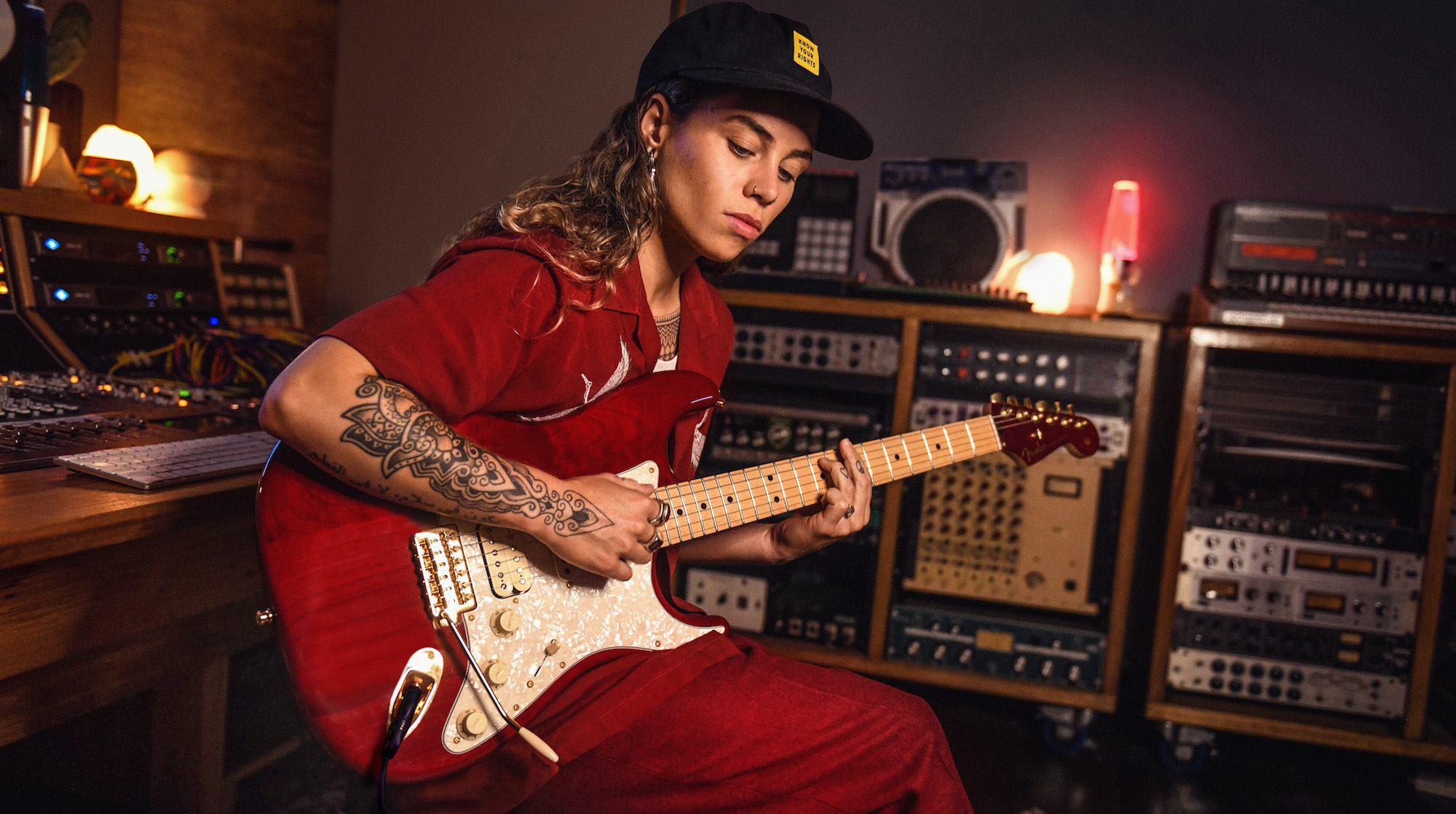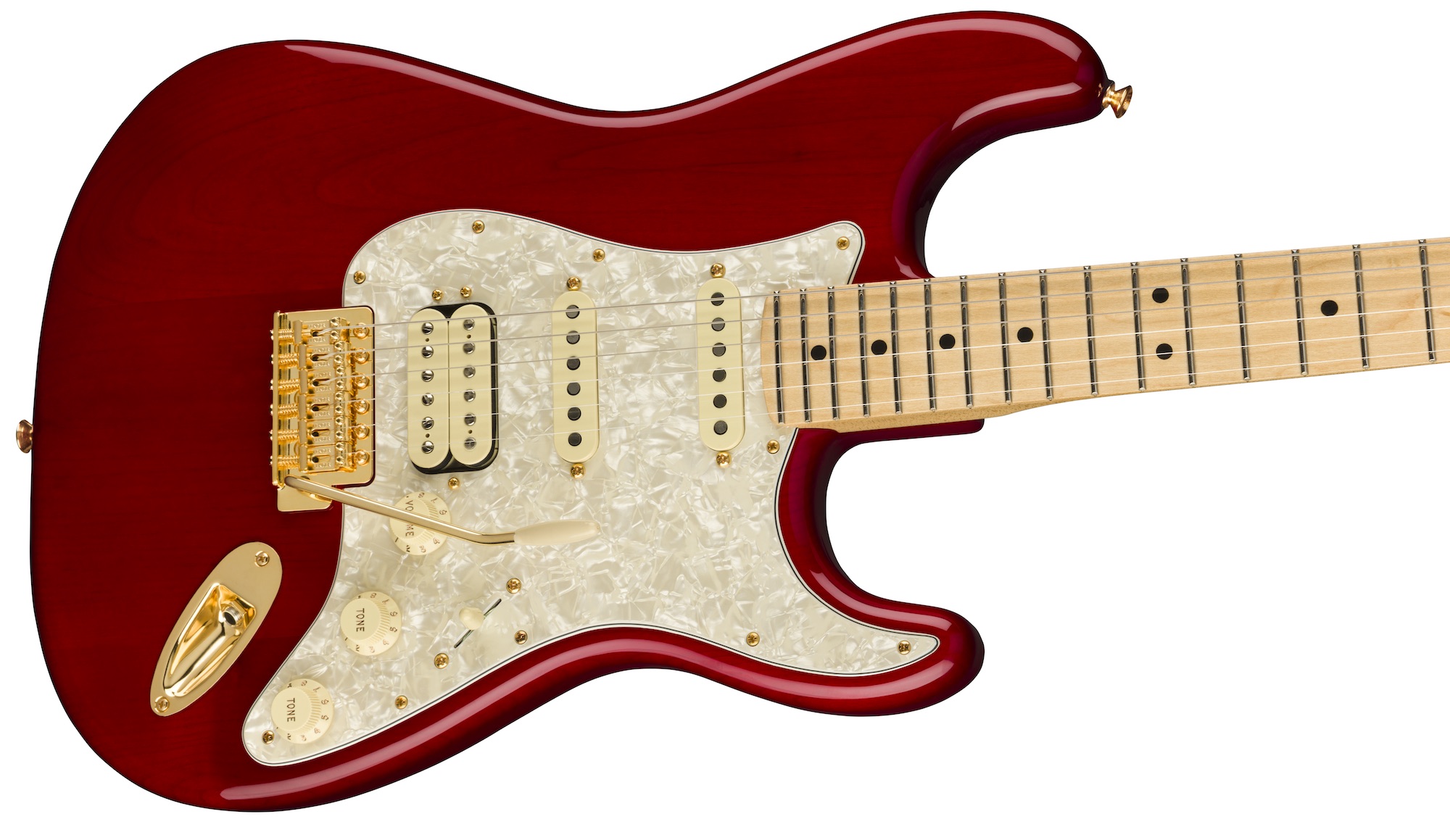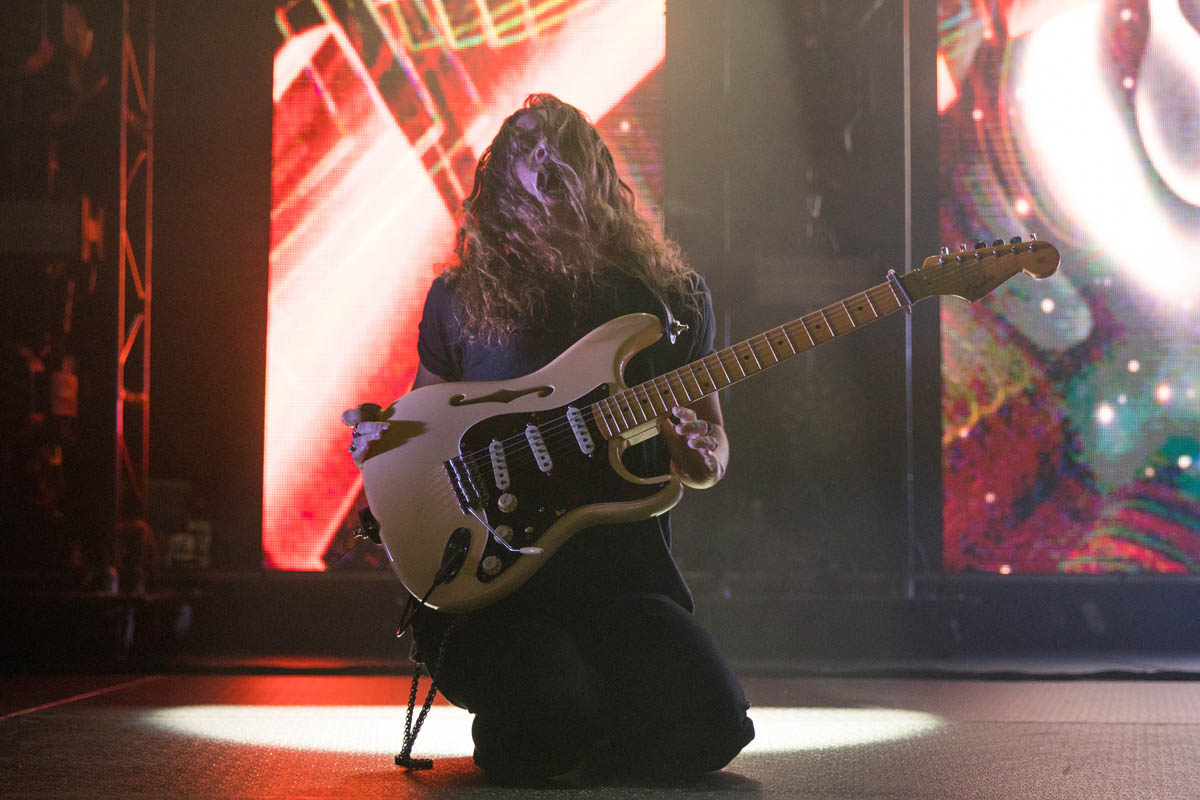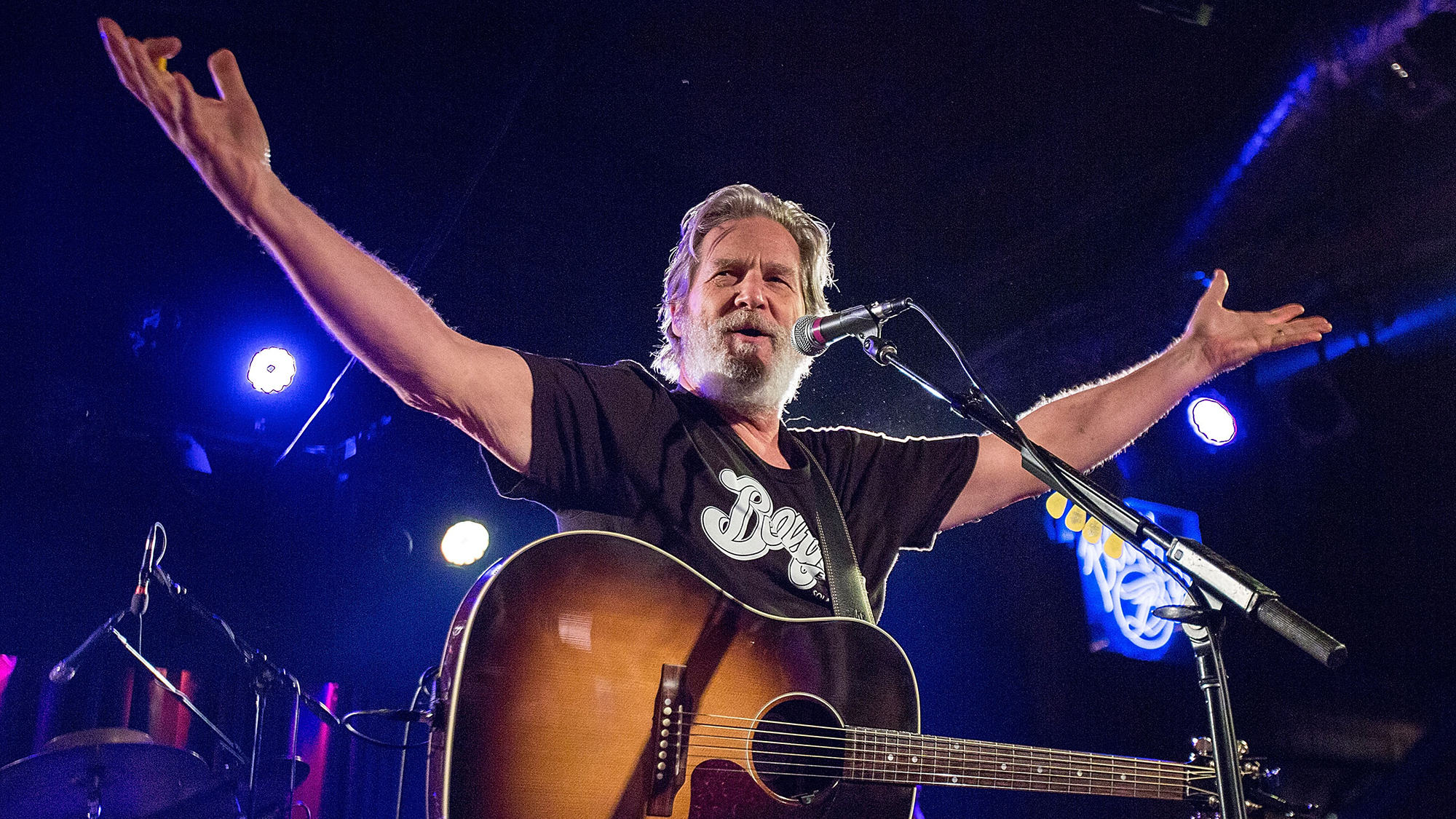
All the latest guitar news, interviews, lessons, reviews, deals and more, direct to your inbox!
You are now subscribed
Your newsletter sign-up was successful
At the age of 18, Tash Sultana was given a high school assignment to list lifetime goals. As it turned out, the young Australian singer-songwriter and multi-instrumentalist had it all mapped out.
“‘I want to get a record deal, and I want to headline music festivals around the world,’” Sultana recalls writing. “And all of that happened by the time I turned 21.”
Before that, though, Sultana busked on the streets of Melbourne and played open-mic nights long past teenage curfews. But this was no solo folkie affair.
Sultana – who identifies as nonbinary and uses the pronouns they and them – complemented their dramatically expressive voice with a penchant for gnashing, big-time electric guitar solos, and perfected a dazzlingly fresh approach to rock and R&B by using looping pedals to create hypnotic, guitar-based soundscapes.
“I just wanted to rip through things with my own flair,” Sultana explains. “There’s no point trying to copy somebody, because it just wastes time. You’ve heard that all before. I was always set on the idea of being my authentic self, and I didn’t really need any other musicians to do my thing. My sound was my truth.”
I just wanted to rip through things with my own flair. There’s no point trying to copy somebody, because it just wastes time
That singular sound went viral in 2016 thanks to a couple of “live bedroom” videos of the original songs “Jungle” and “Notion” that showed off Sultana’s preternatural skills.
Rather than simply performing the songs, the guitarist seemed to inhabit them – the fiery guitar solos and soulful vocals exploded from somewhere deep within – and one could almost feel the breakneck joy they got from making them.
All the latest guitar news, interviews, lessons, reviews, deals and more, direct to your inbox!
The videos racked up tens of millions of views, and it wasn’t long before Sultana was making good on that high school assignment, headlining festivals and signing a deal with Mom + Pop Records.
On their first releases, 2016’s Notion EP and 2018’s full-length debut, Flow State, Sultana proved to be a formidable talent, playing all of the instruments and serving as self-producer. On the just-released Terra Firma (Lonely Lands), they opened themselves up to collaborators, working with fellow Aussie singer-songwriter and New Zealand–based producer Dann Hume.
“At first I was like, ‘I don’t need anyone to come in. I’m just going to take this as far as I can without anybody else’s influence,’” Sultana says. “Now that I’ve heard how it can sound with other people involved, I’m like, ‘Oh, this is sick!’ I think I’m addicted to the collab now. You can still do your own thing, but it’s like you can get an added injection of inspiration into you.”
Terra Firma is a record that listeners can get lost in. Sultana’s sonic presentation is spread across a collection of deeply introspective songs that touch on soul, funk, pop, R&B, and hip-hop.
There are dashes of rock and even folk. It’s a deceptively crafty concoction that feels thoroughly organic and effortless. Intoxicating guitar loops on blissed-out tracks like “Pretty Lady” and “Sweet & Dandy” bury themselves into the thicket of one’s senses, and the cavernous soundscapes that form the musical beds of “Coma,” “Let the Light In,” and “I Am Free” unfold like dreams.
It’s all dynamic, head-turning stuff, and for a young artist so front-loaded with early acclaim – in Australia, Sultana has already won the prestigious Unearthed Triple J Award and been nominated for various Aria Awards, including Breakthrough Artist – it’s proof-positive that all the hoopla was warranted.
In addition to acclaim for their music, Sultana now has a Fender signature Stratocaster model. The guitar has an alder body, maple neck and fingerboard, two single-coil pickups in the neck and middle position, a humbucker in the bridge position, and a vintage-style synchronized tremolo.
Finished in Transparent Red and sporting gold hardware and a matching painted headstock, it’s an eye-catching instrument that celebrates Sultana’s long embrace of the Fender brand. Had it not been for the Covid-19 pandemic, Sultana would be on tour right now, and they’ve recently hired three session musicians for eventual live shows.

“I don’t want any more sonic boundaries when I play the new stuff onstage,” the guitarist explains. “There are so many parts to these new songs, and I just thought, alright, I’ll put three other people up there with me. They’ll add to the loops and sounds.”
However, the unplanned time off from the road turned out to be a blessing in terms of finishing Terra Firma. “I’ve had a pretty hectic touring schedule, and to try to wedge this album between tours would have been impossible. So in a funny way, time off has been great. There’s the live era and there’s the recording era, and I was happy not to have to mix them up.”
Terra Firma is a great guitar record, but it’s also a great mainstream-pop album.
Really? Wow, I never thought of it that way, but I get you. I’ve been listening to heaps of Marvin Gaye, actually; that era has greatly inspired this record. To me, the record is a timestamp of all my experiences, past and present. It’s also a fusion of the music I love. This is where I’ve been trying to go. I progress, and I refine, refine… I’m just so keen to unleash this to people.
Let’s talk about your development as a guitar player. You started young, so would you say you put in the typical “10,000 hours”?
10,000 hours? Say what? [laughs]
It’s the theory that to achieve mastery of a particular skill, you need to put in 10,000 hours.
Well, I never thought about it, but I guess if wanted to be in the medical field, I could’ve put the hours in. But that’s not me – music’s my field. I put the time in constantly. I’d literally bail school, skate home, and get blazed, and I’d get the guitar to see what I could write.
There were people who weren’t encouraging. They’d say, “You’re not going to get anywhere,” And I’d be like, “Watch me.” My teachers were on me about my attendance because I was out playing gigs. After school, I’d change out of my uniform and do open-mic nights.

You have a wonderful hybrid-picking technique. How did you develop it?
I just watched people and picked up on it. I liked the tone they got. But I saw them all keep their fingernails really long, or they used acrylic nails on their picking hand.
I literally can’t stand to have long nails, and I cut them every single day. I developed a technique in which I pluck with my middle, ring, and pinkie fingers, and then I use my index finger and thumb to hold the pick.
Did you have any horrible experiences doing open-mic nights or busking on the street?
Oh, hell yeah. I had someone throw a wine bottle at me. That was fun. There were drunken rows on the street between homeless people – more bottles getting smashed all over. You know, I came to play music and there’s all these people getting put in the back of a police van. Lots of crazy shit.
Did it take a while for you to build up your confidence to play in front of people?
I always felt confident. I always brought a sense of relaxation to what I did. When I was busking, I would try to re-create the feeling of a lounge room. I’d lay out a rug and put up ornaments and stuff. I just wanted to create my own environment, no matter where I was.
Any equipment nightmares while busking?
Sure. I used to use a car battery for power, and I’d cram so much shit in my line, so the power would drain really quickly. I’d have a good crowd, and people would be throwing coins. Halfway through a song the power would die, and I’d be like, “Sorry, everyone. Battery’s dead. Show’s over.”
You use distortion on your solos, but echo is also a big part of your sound.
Yeah, when I’m ripping solos, I love distortion, but echo, that’s a sick sound. I’m a stereo freak, so everything’s stereo galore. When I’m building a song, my rhythm tone is clean, wide, and warm. Then I layer things on top, and that’s when the effects come in. I like to stick behind the beat and put echo on my guitar. That space is beautiful – the mood, the movement, the percussion.
The songs “Musk” and “Crop Circles” are rooted in ’70s soul…
Definitely. There’s Marvin Gaye, Aretha Franklin, the Isley Brothers…
Throughout much of those songs, you’re content to vamp chords. It’s almost about how much you don’t play.
Absolutely. They say enough. “Musk” is a looping track, and that’ll be the new entry to the live show. “Crop Circles” is an old thing that I used to warm up with in my dressing room. I wasn’t even going to do anything with it, but I showed it to some other people and they were like, “What’s that? What are you doing? Put that on the record!” So I did.
Speaking of older songs, it took you six years to write “Pretty Lady.”
That was one of the old busking songs I used to whip out. It’s got all these guitar parts. It’s nuts.
I like a rhythm layer first, which is an electric guitar, and then I layer heaps of mandolin loops over the top. And then I do two different guitar solos, but I play them as harmony parts
The main guitar figure is very syncopated, but the vocal melody is languid and dreamy. Did you have a problem making the two fit together?
I don’t know. I used to just beatbox over the top and put a bit of bass in there. I used it for freestyle about the current moment. I put it on the back burner and didn’t really pay any mind to it, but then I was writing the record and I thought, I wonder if any of these archival tunes are worth bringing to light?
That was one of them. What complicated the writing was that the song is really too simple. I couldn’t get my head around it. I needed other people to go, “I can hear the drums in this. I can hear this and that.” And then it just glued itself together.
In “Coma,” it sounds as if you’re using two guitar loops that sort of play off each other and create a soundscape.
Yeah. I like a rhythm layer first, which is an electric guitar, and then I layer heaps of mandolin loops over the top. And then I do two different guitar solos, but I play them as harmony parts. It all sounds pretty cool.
I hear you’re a big fan of amp modeling.
Absolutely. I’ve got so many amps that I love, but they’re such a pain in the ass. You cart them around and they blow fuses. With amp modeling, it’s like I’ve got six, seven, eight, nine, 10 different amps with me at any time. It’s all in my rack and I don’t have to worry about it, and you don’t get all the noise you get with actual amps.
I play on the neck when I want something to be warm and wide. When I’m going to knock into a solo, I’ll put it on the humbucker and just wail
You’ve played Jazzmasters, Strats, and Teles. Are they all on the new album?
No, the new album is pretty much all Strats.
And now you have your own Fender signature model.
Which is nuts, right? [laughs] And I still have this Fender American Pro Series Strat. It’s just an advanced approach to your typical Stratocaster. I really love that for rhythm. I play on the neck when I want something to be warm and wide. When I’m going to knock into a solo, I’ll put it on the humbucker and just wail.
So when we were working out specs for my own guitar, it was a no-brainer to go off something that I really love and that other players love as well. We went through quite a few different colors, but it had to be red in the end – cherry red, matching headstock and gold hardware. I’m pretty happy with it. The prototype’s on the album, and it sounds killer. I’m ready to play that thing out.
- Tash Sultana's new album, Terra Firma, is out now via Mom & Pop Music.

Joe is a freelance journalist who has, over the past few decades, interviewed hundreds of guitarists for Guitar World, Guitar Player, MusicRadar and Classic Rock. He is also a former editor of Guitar World, contributing writer for Guitar Aficionado and VP of A&R for Island Records. He’s an enthusiastic guitarist, but he’s nowhere near the likes of the people he interviews. Surprisingly, his skills are more suited to the drums. If you need a drummer for your Beatles tribute band, look him up.
